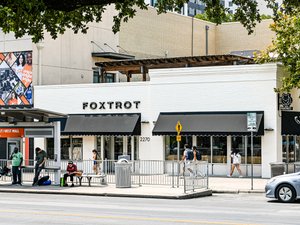Online grocery delivery has taken the tech world by storm. Amazon has invested heavily in Amazon Fresh, its online grocery delivery service. Instacart, a San Francisco grocery delivery startup, was just valued at $3.4 billion after receiving a $400 million investment. Blue Apron has earned itself a $2 billion valuation for its grocery kits, which deliver everything you need to make a meal.
But quietly plodding along has been Skokie-based Peapod, the nearly 30-year-old online grocery company that has avoided virtually all of the tech PR hype around on-demand delivery. Having been built before the internet, survived the dot com bubble, and now faced with a new onslaught of venture-backed competitors, Peapod has remained an under-the-radar giant in the food delivery space--all on its way to becoming a nearly $1 billion business.
Peapod, which is owned by parent company Ahold Delhaize, a Netherlands-based supermarket retailer, calls its relatively low profile both a blessing and a curse, CMO Carrie Bienkowski says. It doesn't generate headlines like Amazon or Instacart, but it also doesn't have to rely on venture capital or report to public investors.
"We're not on Sandhill Road asking for money," Bienkowski said. "We're just focused on delivering great service, growing smartly, and managing operations because that's how you survive in this business."
Surviving the Dot Com Bubble
Founded by brothers Andrew and Thomas Parkinson, Peapod launched in 1989 and required customers to physically download software from CD-ROMs onto their computer to place a grocery order. It would then shop for your groceries at Jewel and deliver them to your home. Back then, the company was almost named IPOD (Information and Product on Demand) but the Parkinson brothers changed it at the last minute while printing business cards at Kinko's.
"I didn’t really like the name that much," Thomas Parkinson said. "I said to my brother, I don’t think IPOD really means anything." We'll never know if that move would've still caused a certain Silicon Valley company to use the name 12 years later.
Peapod pioneered many of the online grocery ordering tools that are commonplace today, like being able to sort by price, description and size. It was the first grocer to use digital coupons, personalized specials, and allow shoppers to create online lists. It was the first company to remember your past order history so you could easily reorder items in the future, Parkinson said. The company went public in the late 1990s and was bought by Royal Ahold in 2001. Ahold merged with Delhaize Group in 2016 to form Ahold Delhaize, which owns several grocery chains such as Stop & Shop, Food Lion, and Hannaford's.
Peapod has evolved as the internet--and consumer shopping habits--have, launching its first website in 1996, developing an app in 2010, and launching digital stores outside transit stops a few years later. It recently launched meal kits--a la Blue Apron--to keep up with the latest food delivery fad, and it's also planning to launch an Amazon Alexa skill to let you voice order your next grocery delivery.
From a margins perspective, groceries is a brutal business. Combine that with last-mile logistics, and the room for error is razor thin. Several companies found this out the hard way in the early 2000s, most notably Webvan, which died in spectacular fashion in 2001 and became a poster child for the dot com crash. The online grocery startup raised $1.2 billion (which at the time was more than any other internet company outside of Amazon) and hired 2,000 employees.
"When Webvan came out, that was a pretty big scary moment for us," Parkinson said.
Webvan tried to undercut Peapod on both price and delivery time, offering half hour delivery windows with no extra fees. Peapod, which had a decade of experience under its belt before Webvan went public, knew that the economics didn't make sense, and Webvan couldn't sustain such low prices.
Parkinson said at the time Peapod employees called Webvan's business model "Waterworld economics," a reference to the 1995 Kevin Costner movie with a massive budget that tanked at the box office.
"The numbers didn't add up," Parkinson said. "We decided not to go down the rabbit hole with them. We stuck to our guns, serving our customers really well but sticking to two hour windows and a delivery fee of $6."
Webvan ultimately over-promised and under-delivered, as did other online grocery competitors like Kozmo, which also went out of business in 2001.
History Repeating Itself?
Much like how grocery delivery players fizzled out in the early 2000s, Parkinson sees the venture-backed giants operating in similarly sketchy economics.
We’ve got well funded competitors like Instacart, who you know at some point their money is going to run out
"We’ve got well funded competitors like Instacart, who you know at some point their money is going to run out," Parkinson said. "We know the economics don’t work."
"I can almost tell you when the new CFO arrived at these companies," Bienkowski added, "because they start doing things like increasing fees, or lowering employee wages or contractor wages ... The realities of grocery margins and the realities of last-mile logistics with food is very complicated and very sophisticated if you don’t have very tight operations."
Peapod had to get smart with logistics, and figure out the best way to pick food fast, deliver it fast, and make sure it didn't spoil.
"We had to get really really good at picking 60 different items in three different temperature zones," Parkinson said. "Our competition still struggles with that, and I think we’ve figured that out over the years."
Peapod's Growth
Peadpod is currently in 24 markets, mostly in the the Midwest and Northeast. The company has more than 2,000 full-time employees along with over 350 part time workers and 600 product selectors who are doing the shopping. Peapod opened a downtown Chicago office inside the Civic Opera Building in 2013 to attract tech talent and other workers who didn't want to trek out to Skokie, which has grown to hold over 130 Peapod employees today.
Peapod doesn't disclose revenue figures, but industry analysts said Peapod reported sales of $550 million in 2013. Bienkowski said that number is "significantly more" today. Peapod says it has delivered 40 million orders since 1989.
The company believes there's still plenty of room to grow. Online grocery is only a small fraction--4.3%--of total US food and beverage sales. And analysts expect that to rise to as much as 20% by 2025, according to a report by FMI-Nielsen, which would mean online grocery could reach more than $100 billion. Online grocery sales last year were $20.5 billion.
But as upstarts threaten to take away part of Peapod's market share, the company is betting that its decades of food delivery experience will win out. And Peapod believes it has one major advantage on its competition: the suburbs.
"Unlike a lot of our competitors, we’ve cracked the suburbs," Bienkowski said. "There's a myth that online grocery will be driven by urban millennials. The numbers we see really disprove that ... Our business is pretty evenly split between suburban and urban zip codes."
Nevertheless, the competition remains fierce, even beyond Amazon and Instacart. Grocers like ShopRite and FreshDirect offer similar services to Peapod and operate in some of the same markets. Amazon is even investing in brick-and-mortar locations that allow customers to order online and pick up items at the store--a move that gives customers the convenience of avoiding the store, but without paying delivery fees.
Peapod says it plans to strengthen its presence in its current markets, and will slowly expand to new areas in the future.
"To exist and survive in this market long term, you have to be operationally efficient," Bienkowski said. "We believe there is significant upside growth potential in every market we compete in."








